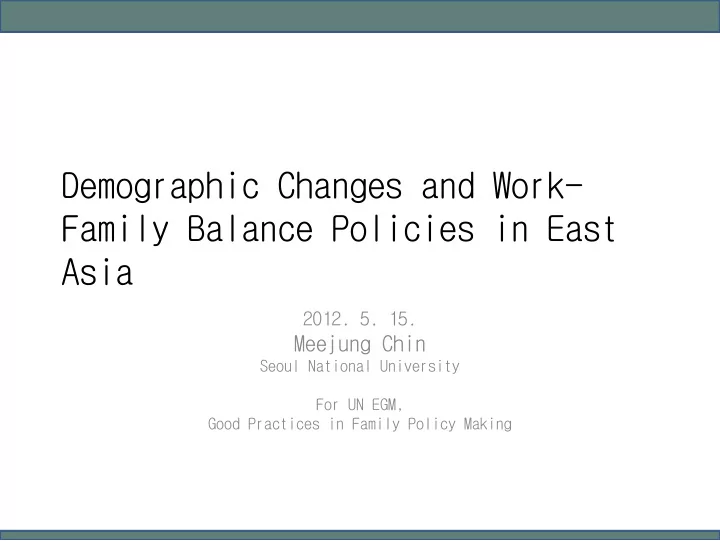

Demographic Changes and Work- Family Balance Policies in East Asia 2012. 5. 15. Meejung Chin Seoul National University For UN EGM, Good Practices in Family Policy Making
Purposes of This Presentation • To explain how demographic changes facilitate the development of work- family policies in East Asia • To discuss the lessons learned from the East Asian experiences
East Asian Countries Share • the common cultural backgrounds • recent demographic changes in fertility trends • a similar pattern in the process of family policy development
Social and Cultural Backgrounds • East Asian countries are described as developmental states (Chang, 2010) • Social policy has been subordinated to economic policy • Family-reliant welfare states based on the tradition of Confucianism (Goodman & Peng, 1996)
TFRs of Three East Asian Countries
Governments’ Policy Responses • To expand childcare services • To introduce work-family balance policies including leaves and family- friendly workplace practices
Childcare Services • Increase accessibility to childcare services by increasing the number of childcare facilities • Increase the number of children who are eligible for childcare subsidies and make the childcare as universal services
Maternity and Parental Leave Policies Korea Japan Taiwan, Province of China Act Equal Employment National Labor Gender Equality in and Support for Standard Law Employment Act Work-Family Balance Maternity 90 day paid leave 14 week paid 5 days ~ 8 weeks leave (full) leave (60 % of (full) the usual pay) Parental Up to 1 year until Up to 52 weeks Up to 2 years until leave the child reaches until the child the child reaches 6 th birthday (40 % reaches 1 st 3 rd birthday (60 % of usual pay) birthday (30 ~ of usual pay) 60 % of usual pay) Source Employment Labor Insurance Employment Insurance Insurance
Family Friendly Workplace Policies • Reduced working hours for workers who eligible for parental leave • Flex time policies for start and finishing times
Experiences of the East Asian Countries • Universal childcare but low quality of care • Good family-friendly workplace policies but low utilization • Failed to increase TFR but could develop family policy
Good Practice of W-F Balance Policy in Korea • Framework Act on Healthy Families of 2004 • Promoting Family Friendly Society Act of 2008 • To change work-oriented culture into family friendly culture by reducing working hours • To involve more men in family life
Good Practice of W-F Balance Policy in Korea • Provide fatherhood education and FF programs at workplaces • Provide family programs at local Healthy Family Support Centers (HFSC) • Launch a national family campaign on Family Day (every Wednesday)
Recommendations • Attempt to change workplace culture • Target men and provide workplace- based education and services • Equip various types of policy instruments including childcare services, leaves, and family friendly workplace policies • Increase collaboration across the government ministries
Recommend
More recommend